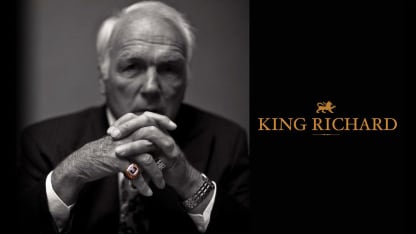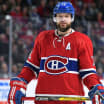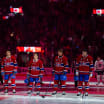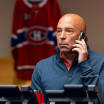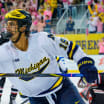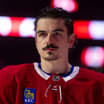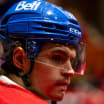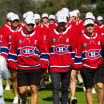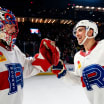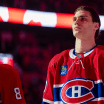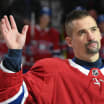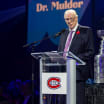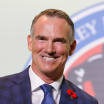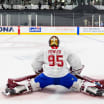By Manny Almela
This article originally appeared in the April/May 2008 issue of CANADIENS magazine.
Henri Richard was never the biggest player on the ice, but few athletes loom larger over their sport. After having raised the Stanley Cup a league-record 11 occasions, Richard is considered veritable hockey royalty. In fact, his only equal in all of pro sports is the NBA's Bill Russell of the Boston Celtics' dynasty of the 1960s, who also boasts 11 titles.
Richard didn't have to wait long to cozy up to hockey's Holy Grail. As a fresh-faced 19-year-old with the 1955-56 Canadiens, the kid then solely known as "The Rocket's" little brother did his part in helping Montreal win its first of five-straight Stanley Cups. With 10 more championships to follow for the "The Pocket Rocket," the question of which Cup he cherishes most requires some understandable reflection.
"That's a tough one," said Richard, whose trademark No. 16 hangs high above the ice at the Bell Centre. "I'd have to say my first one. It's always special because it doesn't matter how many you win, you get that first one only once."
Having the chance to skate alongside his big brother Maurice made his early career success that much sweeter.
"I never imagined getting the chance to actually play with my brother," he admitted. "I mean, when Maurice broke into the NHL I was only six years old. When he saw that I made the team at 19, he decided to keep playing a little longer because of it and that always meant a lot to me."
The pressure of following in the footsteps of a legend like "The Rocket" wasn't always easy, but that didn't stop the younger brother from becoming a great player in his own right. According to longtime teammate and fellow Canadiens legend Jean Beliveau, the fact that Richard never joined the obscure ranks of trivia answers like Brent Gretzky and Alain Lemieux is testament to Henri's character.
"When he first came on the scene, after every game Henri played people would ask him, 'How's Maurice doing?'" recalled Beliveau, who played with the younger Richard for 16 seasons. "He would always respond, 'He's fine,' and then move on. He understood that was a part of his reality and he patiently waited for his chance to prove himself. It took some time -- maybe even too long -- for him to get the respect he deserved. The important thing to him was that his teammates in the dressing room knew what he could do and how key he was to their success.
"He was an incredibly important player for this organization," affirmed Beliveau, who won all 10 of his Cups with Henri by his side. "It's a credit to him to have accomplished all that he did with such big shoes to fill. His brother was a tough act to follow, to say the least."
While both Richard brothers were blessed with the legendary icy glare that seemed to burn a hole through opponents, they were different types of players.
"Maurice was a goal scorer and Henri was a playmaker," recalled Beliveau. "Henri began to move from his brother's shadow when he showed the way he could control a game and dictate play. They were both men of few words who let their actions speak for themselves. Henri let others talk. He did it on the ice, always on the ice.
"You couldn't ask for a better teammate," Beliveau added. "He was among those who voted for me to become captain in 1961, and I always knew I could count on Henri in big games and in the most critical situations."
Situations didn't get more critical than Game 7 of the 1971 Stanley Cup Finals against the Blackhawks. With the score knotted at 2-2 late in the third period, Richard came to the Canadiens' rescue by beating Tony Esposito up high in a 3-2 Cup-clinching victory.
Despite living countless triumphant moments such as that memorable night in Chicago, Richard's proudest accomplishment has little to do with anything that appears on his endless list of individual achievements.
"Nothing means more to me than having played for the Montreal Canadiens," revealed Richard, who suited up for a franchise-record 1,256 games with the Habs. "I was never supposed to even make it to the NHL. They said I didn't have what it took, that I was too small, but then I ended up playing for 20 years."
Listed at 5-foot-7 during his playing days, Richard remains nonetheless a giant of the game. The embodiment of what it takes to win, he built his reputation on coming through when everything was on the line.
"I've always felt that playoff success comes down to a team's defense, but having good scorers up front doesn't hurt, either," admitted Richard with a smile. "Having that solid foundation behind you is what I've always felt makes the difference during a grueling playoff series."
Even with those elements in place throughout his brilliant career, the bullseye stitched to Richard's chest in the form of the Canadiens' crest should have made the legend's road to glory even tougher. Yet Richard downplays the notion.
"The pressure to win that exists in Montreal was always there, but I didn't feel it," he said. "We had such confidence and faith in one another that nothing else really affected us.
"The playoffs are all about teamwork and being there for each other," explained Richard, who has played more postseason games than any forward in club history. "That's where it all started for us, and I don't think that's changed in today's NHL. Without that closeness, I don't think we would have enjoyed all the success we did. We were a family. And a team that sticks together, wins together."

